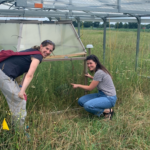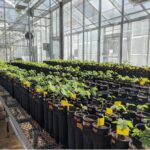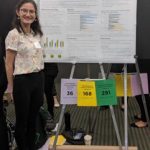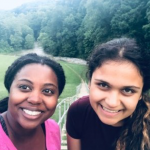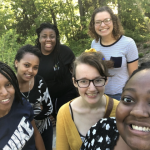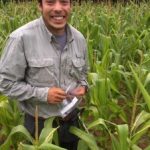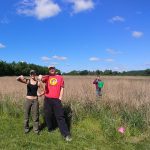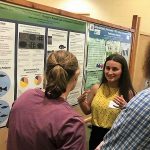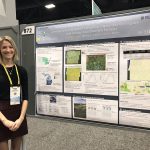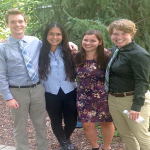Moriah Young is a graduate student at the Kellogg Biological Station and a member of Phoebe Zarnetske's Lab. Her PhD research seeks to understand the effects of climate change on soil biota, plant, and herbivore interactions. Using a combination of field and greenhouse studies, Moriah works to understand the ways in which the composition and structure of soil microbial communities respond to warming and drought, as well as describing the role that the soil microbial community has on plant traits, stress responses, and insect preferences in the presence of warming and drought. I went into
Studying small populations using big experiments: Reflections from an LTER Fellow
Isabela Borges is a graduate student in Sarah Fitzpatrick's lab in the Integrative Biology department at Michigan State University. Isabela won the J.S. Karling Graduate Student Research Award from the Botanical Society of America for her work on plant inbreeding on the legume-rhizobia mutualism. She is broadly interested in the feedbacks between community ecology and contemporary evolution, and their consequences for the persistence of small populations. Summer 2021 was a busy one. When I first proposed to conduct an experiment on two thousand plants, that just seemed like a nice large
Learning the importance of interdisciplinary work: Reflections from an undergraduate researcher
Kellogg Biological Station (KBS) LTER 2019 undergraduate summer researcher, Ashlyn Royce. She wrote about her KBS LTER Research Experiences for Undergraduates (REU) project working with the Marquart-Pyatt Lab. The summer of 2019 I was selected to work with Dr. Sandy Marquart-Pyatt and her research team through the Michigan State University's Kellogg Biological Station (KBS) Research Experience for Undergraduates (REU) program, specifically working with the KBS Long Term Ecological Research (LTER) Panel Farmer Survey. After accepting the position, I was a bit unsure of what to
Diving deep into soil: Reflections from an undergrad researcher
Kellogg Biological Station (KBS) LTER 2019 undergraduate summer researcher, Aista Sall, from University of South Florida. She wrote about her KBS LTER Research Experiences for Undergraduates (REU) project working in Dr. Steve Culman's lab at the Wooster Campus of The Ohio State University. The midwest has always been a place I wanted to visit, due to its natural beauty and wide range of activities that it offers. So when the opportunity presented itself for me to do a dual Research Experience for Undergraduates (REU) for the Kellogg Biological Station Long Term Ecological Research (KBS
Learning to step out of my comfort zone at KBS
Kellogg Biological Station (KBS) 2018 undergraduate summer researcher, Selassie Lijelu, is a Forensic Chemistry major at the University of Saint Francis-Fort Wayne. She wrote about herKBS Research Experiences for Undergraduates (REU) project working with the Haddad Lab. The summer of 2018, I was selected to participate in the Michigan State University Kellogg Biological Station (KBS)Research Experience for Undergraduates (REU) program. When I accepted the offer, I was extremely nervous and had no idea what the next eleven weeks in Hickory Corners, Michigan would consist of. I was
Poco a poco: The little nopalito in a cornfield
Kellogg Biological Station (KBS) 2018 undergraduate summer researcher, Nicholas Vega Anguiano, is an undergraduate student at Humboldt State University. He wrote about his KBS Research Experiences for Undergraduates (REU) project working with Kate Glanville in the Robertson Lab. Anticipation and nervousness of my impending interview with a W.K. Kellogg Biological Station (KBS) graduate student, Kate Glanville, sent my body into a state of nerves. Throat tight, palms sweaty, and a million doubts running through my mind. Seven minutes until we were scheduled to meet, via a
My time as an REU: learning the research process
Kellogg Biological Station (KBS) 2018 undergraduate summer researcher, Audrey Hogenkamp, an Applied mathematics and biology dual major at Augustana College. She wrote about her KBS Research Experiences for Undergraduates (REU) project working with the Evans Lab. There are pages and pages that I could write about everything that I learned during my summer at W.K. Kellogg Biological Station (KBS). Each individual that I encountered had such an incredible passion for their work that I felt like I was constantly inundated with new knowledge—from dinner table conversations with my friends
Waders half full, or half empty?
KBS 2018 undergraduate summer researcher Sharon Carpenter is a junior at Michigan State University. She wrote about her Undergraduate Research Assistant project working with mentor Dr. Sarah Fitzpatrick. Carpenter was funded by a URA award from the Kellogg Biological Station. “Do you remember when you fell into the pond with your waders on?” says Madison Miller, a lab technician in Sarah Fitzpatrick’s lab. As we laughed with tears in our eyes, I knew I found my story for this blog post. Yes, you might be reading and wondering what happened, but first let me tell you a little more about
More than just an REU program
KBS 2018 undergraduate summer researcher Paige Drippe is a senior at University of Michigan. She wrote about her NSF REU project working with the MSU Hydrogeology Lab. When I entered the Research Experience For Undergraduates (REU) program I had the expectation that it will be exactly that - a research experience. I saw it as an opportunity to play grad student for 10 weeks, and expected that once the last day rolled around I would simply pack up and go home. I was lucky enough that that was not my experience. I was the only REU in my lab, and
SLAM: Scientists Love Acronyms, Man
KBS 2018 undergraduate summer researcher Emily Lindback is a junior at Franklin and Marshall College. She wrote about her Research Experiences for Undergraduates project working with mentor and LTER researcher Dr. Michael Abraha in the Robertson Lab. Lindback was funded by an NSF REU site award to the Kellogg Biological Station. Driving into Hickory Corners, I first noticed the dense green vegetation, many marshes, huge agricultural plots, and yes, cows. Hickory Corners seemed like a biologist’s dream, the perfect spot for a biological station.
- 1
- 2
- 3
- 4
- Next Page »
